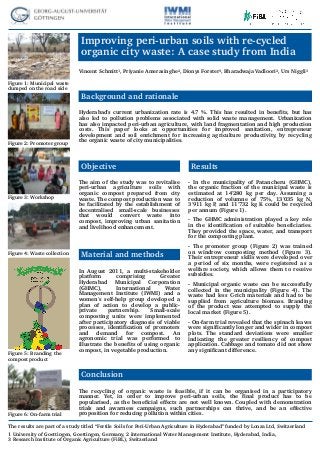
Poster: Improving periurban soils with recycled organic city waste: a case study f…
- 1. Improving periurban soils with recycled organic city waste: A case study from India Vincent Schmitt1, Priyanie Amerasinghe2, Dionys Forster3, Bharadwaja Vadloori2, Urs Niggli3 Figure 1: Municipal waste dumped on the road side Background and rationale Hyderabad's current urbanization rate is 4.7 %. This has resulted in benefits, but has also led to pollution problems associated with solid waste management. Urbanization has also impacted periurban agriculture, with land fragmentation and high production costs. This paper looks at opportunities for improved sanitation, entrepreneur development and soil enrichment for increasing agriculture productivity, by recycling Figure 2: Promoter group the organic waste of city municipalities. Objective Results The aim of the study was to revitalise In the municipality of Patancheru (GHMC), periurban agriculture soils with the organic fraction of the municipal waste is organic compost prepared from city estimated at 14'280 kg per day. Assuming a Figure 3: Workshop waste. The compost production was to reduction of volumne of 75%, 13'035 kg N, be facilitated by the establishment of 3'911 kg P and 11'732 kg K could be recycled , decentralised smallscale businesses per annum (Figure 1). that would convert waste into compost, improving urban sanitation The GHMC administration played a key role and livelihood enhancement. in the identification of suitable beneficiaries. They provided the space, water, and transport for the composting plant. The promoter group (Figure 2) was trained Figure 4: Waste collection on windrow composting method (Figure 3). Material and methods Their entrepreneur skills were developed over a period of six months, were registered as a In August 2011, a multistakeholder welfare society, which allows them to receive platform comprising Greater subsidies. Hyderabad Municipal Corporation Municipal organic waste can be successfully (GHMC), International Water collected in the municipality (Figure 4). The Management Institute (IWMI) and a waste had less Crich materials and had to be women's selfhelp group developed a supplied from agriculture biomass. Branding plan of action to develop a public of the product was attempted to supply the private partnership. Smallscale local market (Figure 5). composting units were implemented after participatory diagnosis of viable Onfarm trial revealed that the spinach leaves processes, identification of promoters were significantly longer and wider in compost and demand for compost. An plots. The standard deviations were smaller agronomic trial was performed to indicating the greater resiliency of compost illustrate the benefits of using organic application. Cabbage and tomato did not show compost, in vegetable production. any significant difference. Figure 5: Branding the compost product Conclusion The recycling of organic waste is feasible, if it can be organised in a participatory manner. Yet, in order to improve periurban soils, the final product has to be popularised, as the beneficial effects are not well known. Coupled with demonstration trials and awarness campaigns, such partnerships can thrive, and be an effective Figure 6: Onfarm trial proposition for reducing pollution within cities. The results are part of a study titled “Fertile Soils for PeriUrban Agriculture in Hyderabad” funded by Lonza Ltd, Switzerland 1 University of Goettingen, Goettingen, Germany, 2 International Water Management Institute, Hyderabad, India, 3 Research Institute of Organic Agriculture (FiBL), Switzerland
